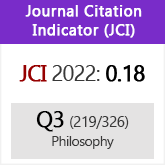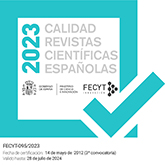Conferencias Aranguren ¿Fin de la intimidad? Entering and Abiding in Ourselves: Against the Transhumanist Threats
DOI:
https://doi.org/10.3989/isegoria.2019.060.02Keywords:
Intimacy, Person, Transhumanism, Digital WorldAbstract
The notion of intimacy has different origins and meanings. In the philosophical tradition, Seneca, Augustine of Hippo, Luther, Pascal, Descartes, Leibniz, Rousseau, Kant, Mill, Freud, Ortega and Zambrano conceived intimacy from different approaches. This contribution devotes special attention to Ortega y Gasset, because it linked self-absorption and technique. It also affirms a voluntarily shared intimacy that develops through intimate relationships in the network. However, some technological systems threaten privacy. This is the case of artificial intelligence promoted by transhumanism, which emerged with the NBIC program (nano-bio-info-cogno, NSF 2001). Transhumanists technoscientists of great worldwide influence, such as Harari, have defended particularly dangerous ideas for the intimacy of people. To combat these threats, it is necessary to promote a shared and networked intimacy. Likewise, the notion of techno-person must be developed, invoking the right to privacy of technopersons in the digital world.
Downloads
References
Aramayo, R. R. (2018), Immanuel Kant. Madrid: Alianza Editorial.
Aranguren, J. L. (1989); "El ámbito de la intimidad", en Carlos Castilla del Pino (ed.), De la intimidad, Barcelona: Crítica, 1989, pp. 17-24.
Béjar, H. (1988), El ámbito íntimo. Privacidad, individualismo y modernidad. Madrid. Alianza.
Béjar, H. (1989), "Individualismo, privacidad: precisiones y andaduras", en Castilla del Pino 1989, pp. 33-57.
Castilla del Pino, C. (1989), De la intimidad. Barcelona. Crítica.
Deleuze, Gi. (1988): El pliegue. Barcelona: Paidós.
Descartes, R. (1977), Meditaciones Metafísicas, Madrid, Alfaguara.
Diéguez, A. (2017), Transhumanismo. La búsqueda tecnológica del mejoramiento humano. Barcelona: Herder.
Echeverría, J. (1999): Los Señores del Aire: Telépolis y el Tercer Entorno, Barcelona, Destino.
Echeverría, J. (2003): La revolución tecnocientífica, Madrid, Fondo de Cultura Económica.
Echeverría, J. (2013), Entre cavernas: de Platón al cerebro pasando por Internet, Madrid, Triacastela.
Echeverría, J. (2017): "Epistemología y axiología de la ciencia: tecnomundos y tecnopersonas", in C. Ambrosini (ed.), Tradiciones y Rupturas. Modulaciones Epistemológicas IV. El Escenario Argentino e Iberoamericano, Remedios de Escalada (Buenos Aires), Ediciones de la UNLa, 2017, pp. 65-78.
Echeverría, J. (2018a): "Philosophy of Technoworlds and Technopersons", in B. Laspra and J. A. López Cerezo (eds)., Spanish Philosophy of Technology. Berlin, Springer, 2018, pp. 153-164. https://doi.org/10.1007/978-3-319-71958-0_11
Echeverría, J. (2018b): "Fábricas de tecnopersonas", in A. Gurrutxaga and A. Ferrater Mora, J. (1998), Diccionario de Filosofía. Barcelona, Ariel, 4 vols. Galarraga (eds.), Industrias que piensan. De la innovación tecnológica al conocimiento social. Madrid: Catarata, pp. 51-73.
García Hoz, V. (1980), El nacimiento de la intimidad. Madrid: Rialp. 1980, 3ª ed. (la 1ª es de 1950).
Harari, Y. No. (2014): Sapiens. Barcelona: Penguin Random House.
Harari, Y. N. (2016): Homo Deus. Barcelona: Penguin Random House. https://doi.org/10.17104/9783406704024
Harari, Yu. N. (2018): 21 lecciones para el siglo XXI. Barcelona: Penguin Random House.
Kant, Im. (1989), La Metafísica de las Costumbres (ed. de de A. Cortina y J. Conill, Madrid, Tecnos.
Kant, I. (2004), Crítica de la razón práctica (ed. Roberto R. Aramayo). Madrid: Alianza.
Kant, I. (2005), Crítica de la razón pura, edición de Pedro Ribas. Madrid. Taurus.
Lacan, J. (1970), Las formaciones del inconsciente. Buenos Aires: Nueva Visión.
Luhmann, Ni. (1985), El amor como pasión. La codificación de la intimidad. Barcelona, Península. Obra original: Liebe als Passio. Zur Codierung von Intimität. Frankfurt: Suhrkamp, 1982.
Lutero, M. (2018), Obras reunidas, edición de Pablo Toribio. Madrid. Trotta.
Muguerza, J. (1994), "El tribunal de la conciencia y la conciencia del tribunal", Doxa, 15-16, pp. 534-560.
Pardo, J. L. (1996), La intimidad, Valencia: Pretextos.
Pardo, J. L. (2012), Políticas de la intimidad. Madrid: Escolar y Mayo. Se publicó previamente en Logos, Anales del Seminario de Metafísica, 32. Madrid: UCM.
Platón (1990), Apología de Sócrates, trad. Enrique López Castellón. Madrid: Espasa Calpe.
Rousseau, J. J. (1959-1995), Oeuvres Complètes, 5 vols. Paris: Gallimard.
Rousseau, J. J. (2016), Ensoñaciones de un paseante solitario y otros escritos autobiográficos, ed. de Roberto R. Aramayo. Madrid: Plaza y Valdés.
Ruiz Miguel, C. (1995), La configuración constitucional del derecho a la intimidad. Madrid: Tecnos.
Santa Teresa de Ávila (1997), Obras Completas. Madrid: BAC 212.
Séneca (1964), Cartas Morales, Madrid, Iberia.
Toscano, M. (2017), "Sobre el concepto de privacidad: la relación entre privacidad e intimidad, Isegoría 57 (julio-diciembre 2017), pp. 533-552.
Woolf, V. (2008), Una habitación propia. Barcelona: Seix Barral. Obra original publicada en 1929.
Zafra, R. (2010), Un cuarto propio conectado. Madrid: Fórcola.
Zafra, R. (2016), Los que miran. Madrid: Fórcola.
Zambrano, M. (2007), El hombre y lo divino, Madrid, FCE.
Downloads
Published
How to Cite
Issue
Section
License
Copyright (c) 2019 Consejo Superior de Investigaciones Científicas (CSIC)

This work is licensed under a Creative Commons Attribution 4.0 International License.
© CSIC. Manuscripts published in both the printed and online versions of this Journal are the property of Consejo Superior de Investigaciones Científicas, and quoting this source is a requirement for any partial or full reproduction.All contents of this electronic edition, except where otherwise noted, are distributed under a “Creative Commons Attribution 4.0 International” (CC BY 4.0) License. You may read here the basic information and the legal text of the license. The indication of the CC BY 4.0 License must be expressly stated in this way when necessary.
Self-archiving in repositories, personal webpages or similar, of any version other than the published by the Editor, is not allowed.














